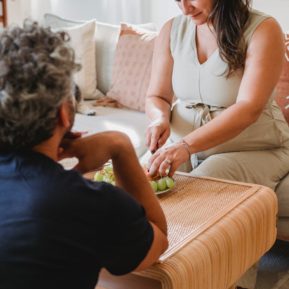Whilst we all wish to have an easy, quick and simple ride to conception and health, sometimes it isn’t that easy. PCOS and Endometriosis are two common conditions impacting women.
There are two important things to think about:
- ONE: working out if you’re impacted (not always obvious).
- TWO: finding the science-backed positive things you can do to manage it. (Good news alert, there are lots!)
We are all about using science to help make every person’s position easier and better when it comes to having healthy kids - no matter what cards you have been dealt.
The good news is that science is evolving. There are lots of things you can do to improve your situation.
The question is: when it comes to Endometriosis, where does the science suggest is worth spending your time and energy?
First and foremost. Do you have Endometriosis?
The stats suggest that between 5-15% of women are affected (1).
So, if you do have Endometriosis, what can you do about it?
The exact cause is unknown. However, there are many theories looking at interrelated factors. Things like retrograde menstruation, which is when some of the endometrium flows backwards during a period (2-4). Genetic predisposition, immune dysfunction. Even some environmental toxins have been linked amongst other things. More to come…
The big question is: what can you do in a positive way to genuinely improve your position?
Six things to think about:
ONE: THE IMMUNE SYSTEM
Every person needs a fighting fit immune system. Endometriosis sufferers should be especially conscious of this. (3)
We are big believers in the power of the gut microbiome when it comes to supporting immune health. There is a huge amount on the site on this and specifically ‘how to’ achieve a healthy gut. However, when it comes to endometriosis – there is another microbiome that needs attention. The Reproductive Microbiome. Keeping this healthy can prevent the wrong type of bacteria creeping in:
Endometriosis and the reproductive microbiome:
The reproductive microbiome is the collection of bacteria in the reproductive area - endometrial, vaginal etc.
Research has started to show that when we get imbalances in bacteria in the reproductive tract, we can get potential problems, including links to Endometriosis.
The problem appears to be when we do not have enough of the protective bacteria Lactobacillus. Studies show that for reproductive age women this should be by far and away the dominant species.
Why?
In a nutshell: Lactobacillus this lowers the pH. You may remember from your days in the school science lab (!) that a lower pH means more acidity. More acidic conditions mean less unwanted bacteria.
We are generally sceptical of the effectiveness of store bought probiotics. However, in this case, a targeted does of Lactobacillus could be helpful and worth exploring with your doctor.
TWO: INFLAMMATION/PAINFUL PERIODS:
Endometriosis is linked with inflammation.
What is inflammation?
Once again, this is tied to the immune system. In a nutshell, inflammation is one of the body’s way of defending itself.
Obviously good, when it's in the right context and amount. However if this ‘defence’ response is always turned on, then it can actually damage normal cells. That's when we get an issue.
Science backed ways to tackle this:
One of the symptoms of endometriosis is severe pain during your period.
What causes this?
Just before your period, the endometrial cells make something called Prostaglandins. When you get your period, and the cells break down, these are released. This causes blood vessels to constrict. It is this that causes painful cramps. The more you have – the worse it is.
Interestingly, a diet in inflammatory fatty acids are the building blocks of these prostaglandins. Specifically things known as Omega 6 fatty derivatives (PGE2 and PGF2 if you want to get really specific!). (11)
Where are these found?
Vegetable oils specifically with high Omega 6: think nasties like Canola oil, Sunflower Oil, Soybean Oil, Corn Oil etc.
Not only do these help produce these Prostaglandins, but they are also inflammatory. Which is exactly what you don’t want when you have endometriosis (or at any other time frankly!)
On the flip side: we want more anti-inflammatory in our lives. The body needs the right ratio of the good stuff (Omega 3) to the ‘bad’ stuff (Omega 6). Seems confusing, but we do actually need some Omega 6, but just a lot less of it than the good-guy: Omega 3.
Omega-3 is particularly good as an anti inflammatory and also for brain development for small people. Simply put though, it is found in fatty fish - just remember to go low down the food chain.
THREE: ESTROGEN AND ENDOMETRIOSIS
Endometriosis is said to be an ‘Estrogen dependent disease’. Obviously we need estrogen as women, however, as always, we don’t want an imbalance. Ie. Too much. (12,13)
However, a few common ways our modern lives contribute:
- Too much estrogen in modern farming ie. added hormones. Easy way to avoid this: when eating animal products, go organic.
- Phytoestrogens and substitutes which are highly refined: refined soy (often found in ‘free from’ or ‘vegan’ foods). Easy way to avoid: whole natural foods and go easy on too much Soy.
- Pesticides: these are known hormone disruptors. We also have a few simple ways (not just buying organic) that you can avoid.
- Filter water: the pill means that our tap water really should be filtered where possible. Even a simple at home filter is better than nothing.
- Plastics: BPA is a known estrogen disruptor. Avoid for your body and for the environment.
- Beauty and Personal Care: One of the worst offenders is added fragrance. Phthalates. Just say no to products where it is added.
- Alcohol: this, weirdly, does contribute to excess estrogen (who knew!) just keep to a minimum where you possibly can.
- BMI: weight is a very touchy subject these days. We don’t mind what people look like, what we care about is weight for health. Unfortunately too much fatty tissue produces more estrogen.
- The Liver….
FOUR: THE LIVER AND ENDOMETRIOSIS
The Liver and the body’s own ability to break down estrogen is key. Our liver is the organ that breaks down toxins. It also breaks down hormones and helps with eliminating them from the body. Particularly important when we have too much.
When it comes to estrogen, the body needs to change it into a form that enables it to be eliminated from the body. If this doesn't happen, then it can get reabsorbed and obviously we have too much.
How to support this?
- The liver is smart. It will prioritise. So if you have a lot of toxins to break down, processing hormones will be further down the list. So: simple thing to do? Reduce toxin exposure where you can. Most obvious: alcohol, smoking, pesticides etc.
- What the liver needs: Indol-3-Carbinol: what (!?) sounds complicated. However, it's surprisingly simple. It is something to do with cruciferous vegetables. All this does is to help produce the enzymes we use to break estrogen down into milder form which can be passed out.
- Glutathione: One of our favourite molecules. This wonder molecule is also key for estrogen processing in the body. It gets added to estrogen for excretion.
FIVE: BACK TO THE GUT
All comes back to the gut! It turns out that the bacteria in the gut also play a role in reabsorption or excretion of excess estrogen. Research shows that prebiotic fibre can play a significant and positive role helping the body do its job here. (16)
SIX: WHAT TO AVOID….
The world is full of all sorts of toxins these days. Trying to avoid them all would be enough to drive anyone mad! So, just get selective. When it comes to Endometriosis, the biggest links are to Dioxins and PCBs.
In a nutshell though? Research has shown that despite noise and fuss around things like tampons and diapers, exposure is really through food. Reducing our exposure to dioxins is really about avoiding too much animal produce. The issue is that dioxins are stored in fat which means we get more when we consume animal produce. Now that doesn’t mean you have to cut it out entirely, just being sensible and eating sparingly is a smart way to go.
Sign up today for unlimited access:
- Book appointments
- Expert advice & tips
- Premium videos & audio
- Curated parenting newsletters
- Chat with your bloss community
- Discounts & competitions
- Special events





Leave a Rating / Review
You must be logged in to post a comment.